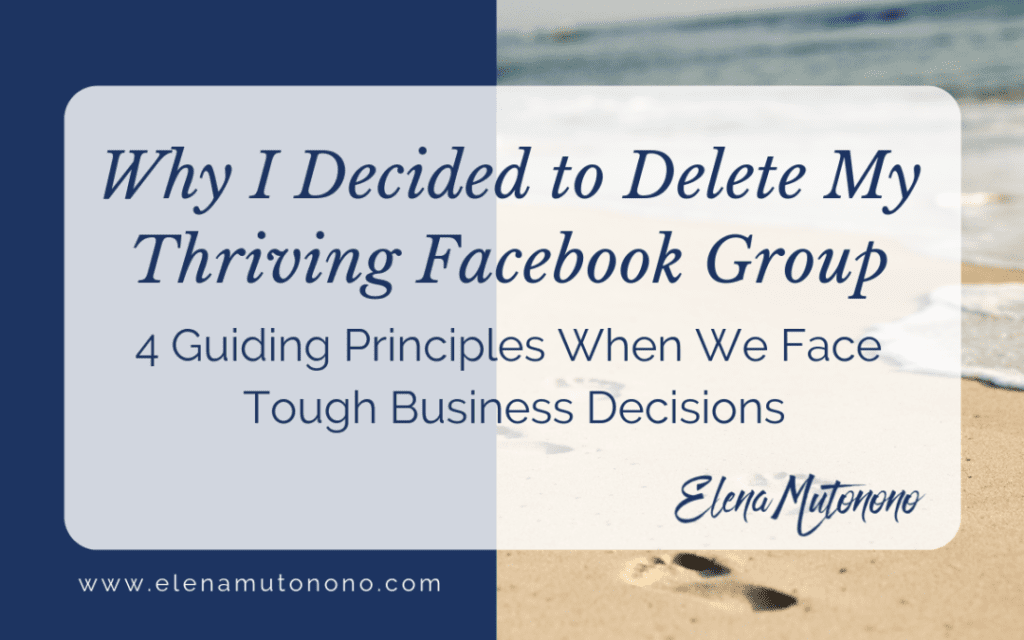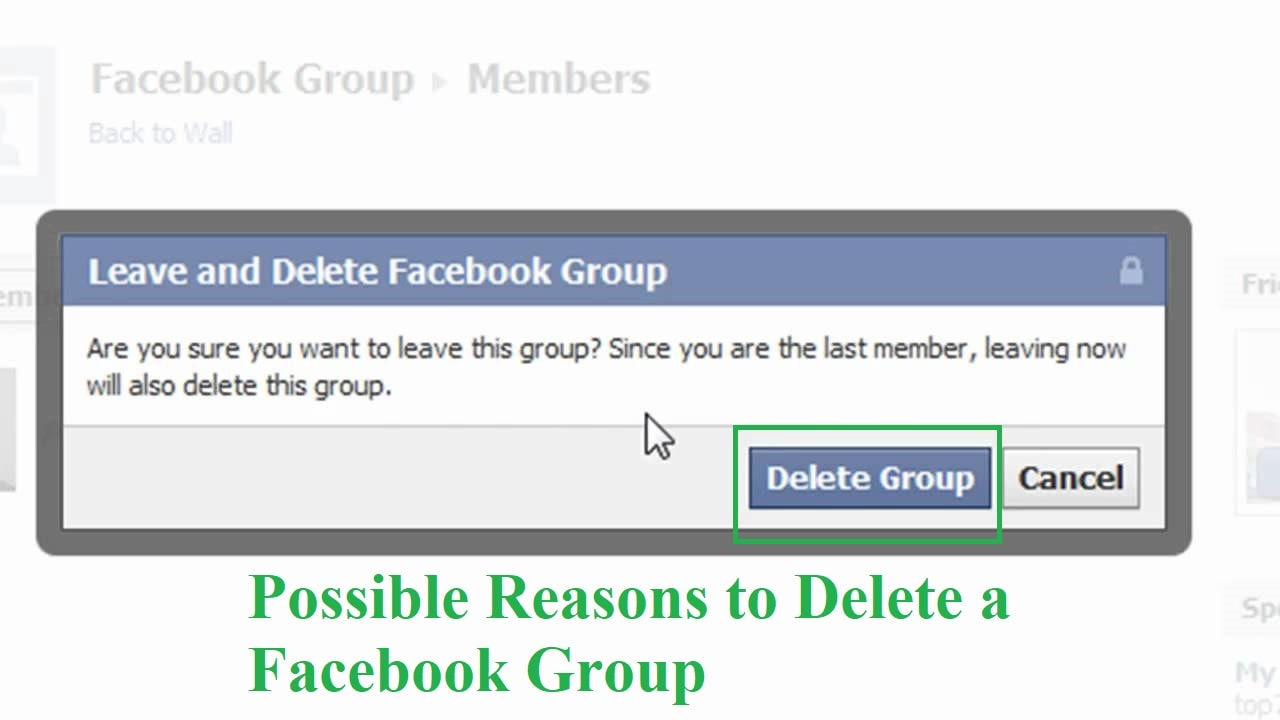Are you looking to delete a Facebook group, but not sure if it’s the right move? Don’t worry, you’re not alone. There are many common reasons why people choose to delete Facebook groups. In this post, we’ll cover the top reasons why you might want to delete a group, and how to do it.
Before we dive into the reasons why you might want to delete a Facebook group, it’s important to understand the two factors that make content effective: perplexity and burstiness. Perplexity refers to the complexity of text, while burstiness measures the variation of sentences. While AI-generated content tends to be uniform, humans tend to write with greater burstiness. So, we’ll make sure to write this post with plenty of variety to keep you engaged and informed. Now, let’s explore the common reasons why you might want to delete a Facebook group.. You may need to know : Effortlessly Delete a Facebook Group with these Simple Steps
Table of Contents
Lack of Engagement
As a tech expert, I have come across a common reason why people want to delete a Facebook group – lack of engagement. Many Facebook group administrators create groups in the hopes of fostering a community where people can share ideas and interact with one another. However, when the group lacks engagement, it can be disheartening for the administrator and members alike.
One clever way to explain why lack of engagement can lead to a desire to delete a Facebook group is to compare it to throwing a party that nobody comes to. You put in all the effort to plan and prepare, but when nobody shows up, it can leave you feeling deflated and wondering what went wrong.
Furthermore, lack of engagement can lead to a stagnant group where the same few people are constantly posting and engaging with one another, while others remain silent. This can create an exclusive atmosphere that discourages new members from joining or participating.
In short, lack of engagement is a valid reason to consider deleting a Facebook group. It can be frustrating to put in the effort to create a community that doesn’t thrive, and sometimes it’s better to move on and explore other avenues for connection and engagement.
Inappropriate Posts
Deleting a Facebook group is a serious decision that should not be taken lightly. Inappropriate posts are one of the most common reasons why group admins choose to delete their groups. These posts can range from offensive language to graphic content. Group admins are responsible for maintaining a safe and respectful environment for their members, and inappropriate posts can quickly ruin that.
The perplexity of inappropriate posts lies in the fact that they can be subjective. What one person finds offensive, another may not. This is why it’s important for group admins to have clear guidelines in place to help members understand what is and isn’t acceptable. Burstiness comes into play when group admins have to decide whether to delete a post or give the member a warning. They must weigh the severity of the post against the member’s history and intentions.
Overall, inappropriate posts can be a headache for group admins and members alike. It’s important for everyone to do their part in keeping the group a safe and respectful space.
Personal Reasons
Deleting a Facebook group can be a tough decision for some users, but there are several reasons why people may choose to do so. One common reason is personal. Perhaps the group no longer serves its original purpose, or the user has lost interest in the topic. They may also want to distance themselves from a particular group member or simply want to declutter their Facebook account.
Another reason may be related to privacy concerns. Users may become wary of the group’s members, or feel uncomfortable with the amount of personal information being shared within the group. In some cases, users may also be concerned about the group’s content and how it reflects on them personally or professionally.
Ultimately, the decision to delete a Facebook group is a personal one that depends on each user’s individual needs and preferences. However, it is important to consider the potential consequences and weigh the benefits against the drawbacks before making a final decision.
Admin Issues
Facebook groups are a popular way for people to connect, share ideas, and discuss topics of interest. However, there are times when group administrators may want to delete a Facebook group. This decision can be based on several reasons, including admin issues.
Admin issues can arise when group administrators face challenges in managing their group. These challenges can include dealing with spam, managing members who violate group rules, or simply being overwhelmed by the demands of moderating a large group. When administrators encounter these issues, they may find it necessary to delete the group.
One of the most common admin issues is dealing with spam. Group administrators must constantly monitor their group to ensure that spam posts are removed promptly. If spam is allowed to accumulate, it can quickly overwhelm the group and make it difficult for members to find valuable content.
Another admin issue is managing members who violate group rules. This can include members who post inappropriate content, harass other members, or engage in other disruptive behavior. Administrators must have a clear set of rules in place and enforce them consistently to maintain a positive group environment.
Finally, some administrators may simply find that managing a Facebook group is too time-consuming or stressful. The demands of moderating a large group can be overwhelming, and administrators may feel that they are not able to meet the needs of their members.
In conclusion, admin issues are just one of many reasons why people may choose to delete a Facebook group. Whether it’s dealing with spam, managing disruptive members, or simply feeling overwhelmed, administrators must carefully consider their options and make the best decision for their group.
Duplicate Group
Have you ever found yourself in the position of running multiple Facebook groups with similar themes? This is a common issue for many group administrators, and it’s known as a duplicate group. A duplicate group is a group with the same or similar purpose as an existing group. It’s easy to see why someone would want to delete a duplicate group. Not only does it reduce confusion for group members, but it also helps to streamline the overall Facebook experience. Plus, it ensures that members are only receiving notifications from one group, rather than multiple groups with similar content. Deleting a duplicate group is the best way to declutter your Facebook experience and reduce unnecessary notifications.
Frequently Asked Questions
What are some common reasons why people choose to delete their Facebook groups?
As a tech expert and blogger, I have come across various reasons why people choose to delete their Facebook groups. One of the most common reasons is the lack of engagement. With the abundance of online communities, people have become more selective about where they spend their time. If a group fails to offer compelling content and meaningful interactions, members may lose interest and eventually leave.
Another reason is the presence of spam or inappropriate content. Facebook groups rely heavily on moderation to ensure a safe and enjoyable experience for all members. If the group admin fails to monitor and remove spam or inappropriate posts, it can quickly turn off members and lead to group deletion.
Privacy concerns are also a major factor. In today’s world, people are increasingly cautious about their personal information online. If they feel that their privacy is compromised by being a part of a Facebook group, they may choose to delete it.
Finally, changes in personal circumstances can also lead to group deletion. For instance, if a group was created for a specific event or purpose that is no longer relevant, members may choose to delete it to avoid clutter in their Facebook feed.
In conclusion, while Facebook groups can be a great way to connect with like-minded individuals, they require consistent effort to maintain engagement and ensure a positive experience for all members. By understanding common reasons for group deletion, admins can take steps to prevent it and create a thriving community.
Can a group admin delete a Facebook group without the approval of other members?
Deleting a Facebook group can be a daunting task and may require the approval of other members of the group. Many group admins wonder if they can delete a group without the consent of the members. The answer is yes, but with certain conditions.
As an admin, you have complete control over the group, including the ability to delete it. However, if there are other admins or moderators in the group, they must also agree to delete the group. This is to prevent any one individual from making a rash decision that could negatively impact the group.
In addition, if the group has a large number of members, it is recommended that you inform them before deleting the group. This will allow them to save any important information or files that they may have shared within the group.
It is important to note that once a group is deleted, all of the content within it will be permanently lost. Therefore, it is crucial to consider all options before making the decision to delete a Facebook group.
In conclusion, as a group admin, you have the power to delete a Facebook group but with certain conditions. It is important to communicate with other admins and members before making any decisions and to consider the impact it may have on the group.
Are there any steps that should be taken before deleting a Facebook group, such as notifying members or backing up content?
Deleting a Facebook group can be a drastic step, and it’s important to consider whether there are alternative options available before taking this action. Firstly, you should notify all group members of your intentions, especially if the group is active and has a significant number of members. This notification can be done via a post on the group’s page or through direct messaging. Additionally, you may want to consider backing up any content that you want to keep before deleting the group. This can be done by downloading the group’s data in the settings menu. It’s important to note that once a group is deleted, the data cannot be retrieved. Therefore, it’s crucial to take the necessary steps before hitting the delete button. By taking these precautions, you can ensure that you are making an informed decision and protecting the interests of yourself and other group members.
Conclusion
Thanks for visits imagerocket.net for reading this article on the common reasons why people want to delete a Facebook group. We hope that we were able to shed some light on the various issues that group administrators and members face when it comes to managing and participating in a Facebook group.
In summary, the most common reasons for wanting to delete a Facebook group include lack of engagement, inappropriate content, spamming, and privacy concerns. It is important for group administrators to address these issues promptly and effectively in order to maintain a healthy and thriving community.
Ultimately, the decision to delete a Facebook group should be made carefully and with consideration for the group’s purpose and members. Communication and transparency are key in ensuring that everyone is on the same page and that the group’s goals are being met.
We hope that this article has been informative and helpful to those who are struggling with managing their Facebook groups. Remember, with the right approach and mindset, Facebook groups can be a powerful tool for building and connecting with like-minded individuals.



